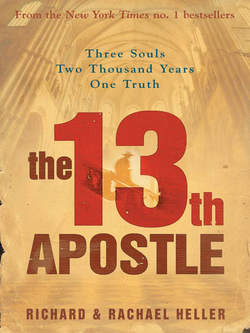Читать книгу The 13th Apostle - Richard Heller - Страница 8
ONE
ОглавлениеPresent day
Day One, early evening
The New York City Grill
In the dim light of the restaurant, Gil Pearson strained to check his watch. He’d give the Professor and Sabbie ten more minutes to show. No more. He was tired and hungry and wanted to go home, grab something to eat, and crawl into bed. This was the last sales pitch dinner that George was going to get him to agree to.
What a way to start a weekend.
“Do this one as a favor to me,” George had cajoled. “You know you’re the reason they come to us. All any client wants is a chance to meet the man who helped rid the world of CyberStrep. You’re a celebrity, for God’s sake. You know they’ll pay triple just to be able to brag to their friends they have you watching over their systems,” George added, trying to appear as endearing as his three chins would permit.
Although Gil hated to admit it, George was right. Since graduating top of his class from Massachusetts Institute of Technology two decades ago, Gil’s anti-hacking discovery had changed the way virtually every major data protection company in the world approached the securing of high-risk and top secret information. For three years running, he had been named Man of the Year by the National Association of Artificial Intelligence, yet no client ever referred to these accomplishments. Only when the New York Times reported that Gil was the creator of the computer program that had eradicated the data-eating virus that held the Internet hostage for almost a month, did anyone take notice. The whole thing might have faded if People magazine hadn’t jumped on the story. They spent three-quarters of the article describing his “rugged good looks” and barely mentioned his work.
Lucy had teased him unmercifully. Within days of the article’s publication, an ever-hungry storm of reporters and paparazzi began to beat a path to his—or rather to CyberNet Forensics, Inc.’s—door.
The company’s worth had gone through the roof, Gil’s salary had more than quadrupled, and he had been dragged, kicking and screaming, from the privacy of his little computer room to the bright lights of celebrity.
That had been four years ago. It couldn’t have come at a worse time. Lucy had just been diagnosed with pancreatic cancer and, though every minute away from her felt like the greatest betrayal he could imagine, Gil had convinced himself that he had to cash in on his fame so that he could pump up his salary while he could. It was the only way he could be sure that Lucy would get the best possible care in the hard times that lay ahead.
A sour taste of bile rose in his throat.
Son-of-a-bitch doctor.
Right from the beginning the bastard had known that Lucy didn’t have more than six weeks left. Had the quack told Gil the truth, he would have spent every precious minute with her. But, instead, the doctor had led him to believe that because of her youth and strength, Lucy’s decline would be unmercifully slow. Months—maybe a year—of painful deterioration were inevitable, the doctor had said; an unthinkable time in which Lucy’s pain could be eased by the best medical care that money could buy.
Instead, she was gone in less than a month, only two weeks before her thirty-fourth birthday. Gil had spent much of that time away from her, in endless interviews, answering asinine questions posed by one stupid reporter after another. Less than a week after it was over, one tabloid cover sported his photo, snapped at the cemetery. The inside copy reported that he was recently widowed and implied that after a suitable time of mourning, he would be an excellent catch.
Gil swallowed against the lump in his throat and forced himself to think about something else.
I’m out of here.
He rose and kicked his chair back hard. As he reached to keep it from falling, something caught his eye.
Gray hair flying, short fat legs waddling, and looking a great deal like the White Rabbit in Alice in Wonderland, Dr. Arnold Ludlow, Professor of Antiquities and consultant on Early Christian Artifacts to the Israel Museum, arrived.
Breathless and dripping, he pealed off his wet raincoat and draped it on his seat back then settled into the chair.
“Sorry I’m late,” he began without introduction. “Your taxis, you know. You can never get one in the rain.”
Gil managed a nod before the Professor continued an account of the many difficulties he’d confronted in a city that seemed bent on preventing him from making this meeting.
“Sabbie didn’t show at the airport but no worries,” Ludlow added, “that’s not unusual for her.”
Gil surrendered to the mounting wave of disappointment. It didn’t really matter anyway. He would sit and wait while the old man prattled on and, when enough time had elapsed so that he could do so without seeming terribly impolite, Gil would reach for the menu.
But he never got the chance.
